AMD Ryzen 5000 IPC Performance Tested
Today we'll be taking a look at Zen 3's IPC performance. IPC stands for "instructions per cycle" and it can be a good indicator of a processor's architecture efficiency. Now, of course, we've already benchmarked all new Ryzen 5000 CPUs and found the performance uplift to be substantial over Zen 2. However, we're still interested in taking a look to check out how Zen 3's IPC compares against Intel's 10th-gen Core series, as well as see what's been AMD's progress with Ryzen over the past three years.
This is something we've done in the past. For example, after the release of Zen 2 we investigated AMD's claim of a 15% IPC improvement and found they weren't exaggerating the performance improvements. With cores and clock speeds at parity, the R7 3800X provided an 18% improvement over the 2700X in the Cinebench multi-core test and 13% for the single-core test. Then we saw a 13% improvement in V-Ray and Corona, while gaming performance was improved by 13% on average.
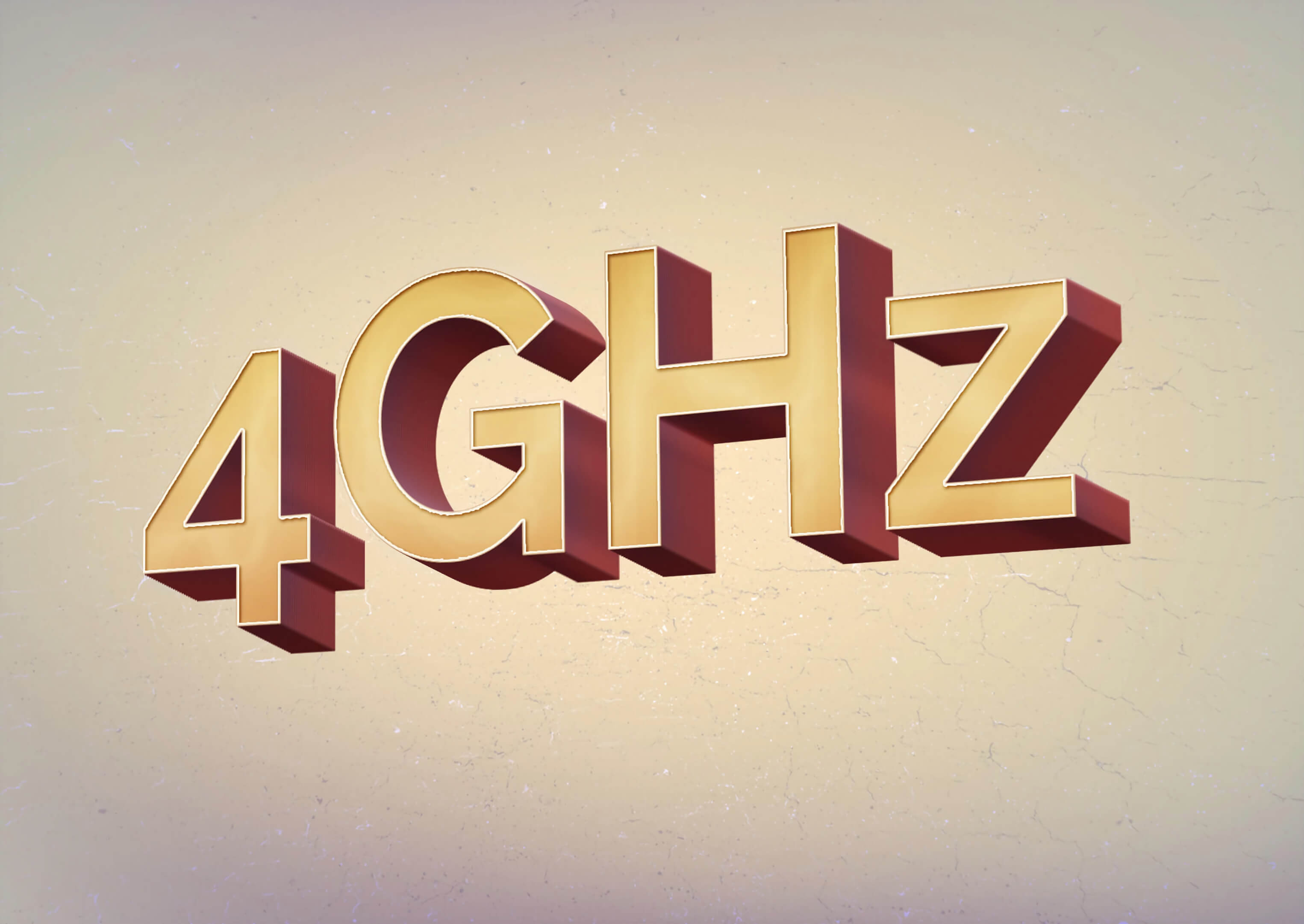
Considering the baby steps we've seen Intel make over the past 6 or 7 generations, a 15% jump from Zen+ to Zen 2 was big news and with Zen 3 we were really hoping to see more double-digit gains. AMD attributes new gains to cache prefetching, execution engine, branch predictor, micro-op cache, front end and load/store improvements.
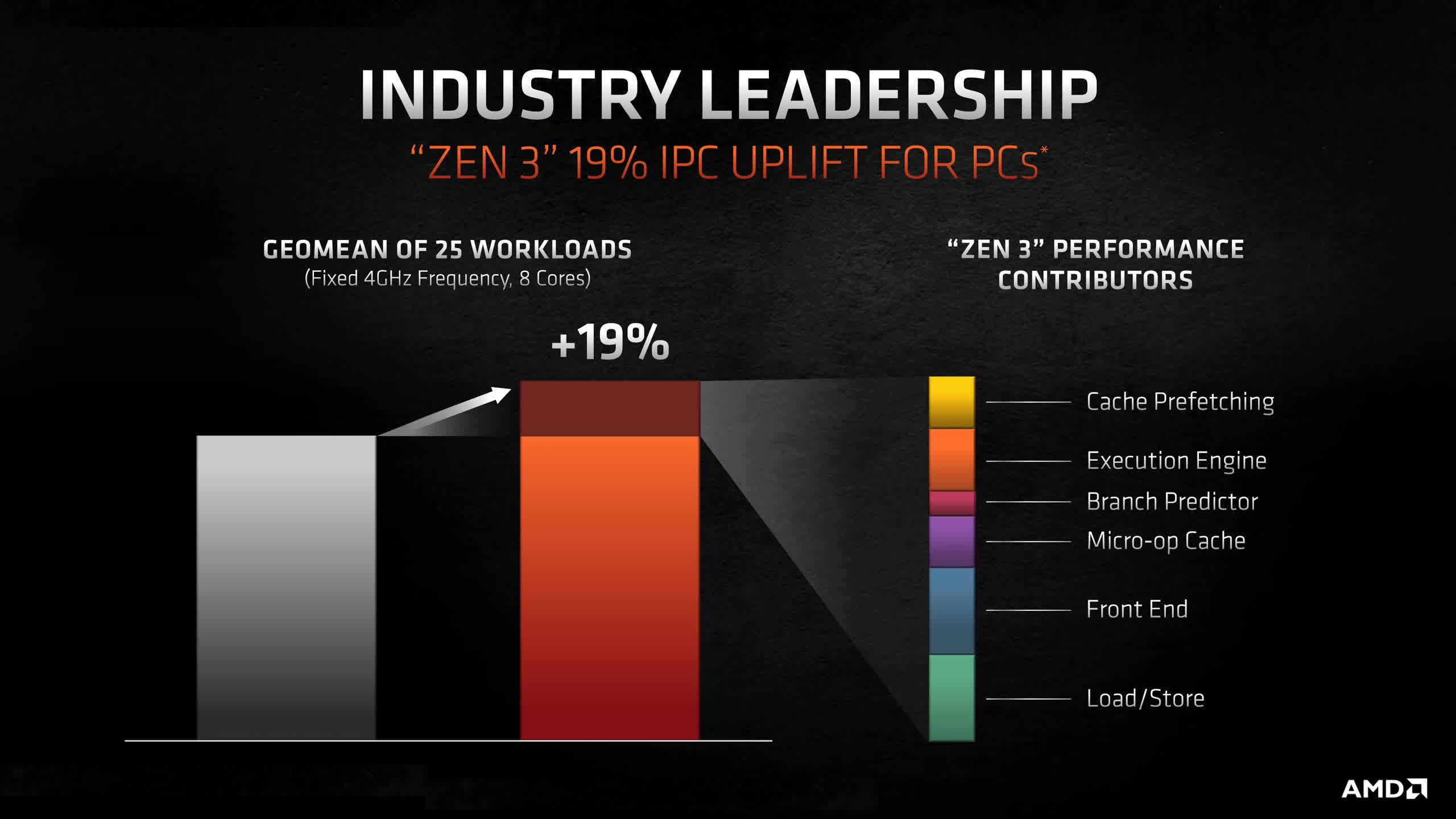
AMD used a wide range of applications and games to arrive at the 19% claim over Zen 2, using 8 core processors operating at a fixed 4 GHz clock speed. This is exactly how we've tested IPC gains in the past, so we'll stick to that method. On the memory front, all test configurations used four 8GB DDR4-3200 CL14 memory modules. All CPUs were cooled using Corsair's iCUE H150i AIO and paired with Nvidia's GeForce RTX 3090. This is all-new fresh data to go over, we recycled nothing from our previous tests, so let's get into the graphs.
Benchmarks
As usual, Cinebench R20 goes first, where we find an 11% IPC improvement for the 5800X over the 3800X (Zen 3 vs. Zen 2). Not quite 19%, but remember that was the average, so presumably we'll find bigger gains elsewhere.
It's remarkable that in 3 years AMD has achieved a 35% performance uplift clock for clock from the original Zen architecture. It's also crazy to see them leading Intel by nearly 30% when matched at the same clock frequency.
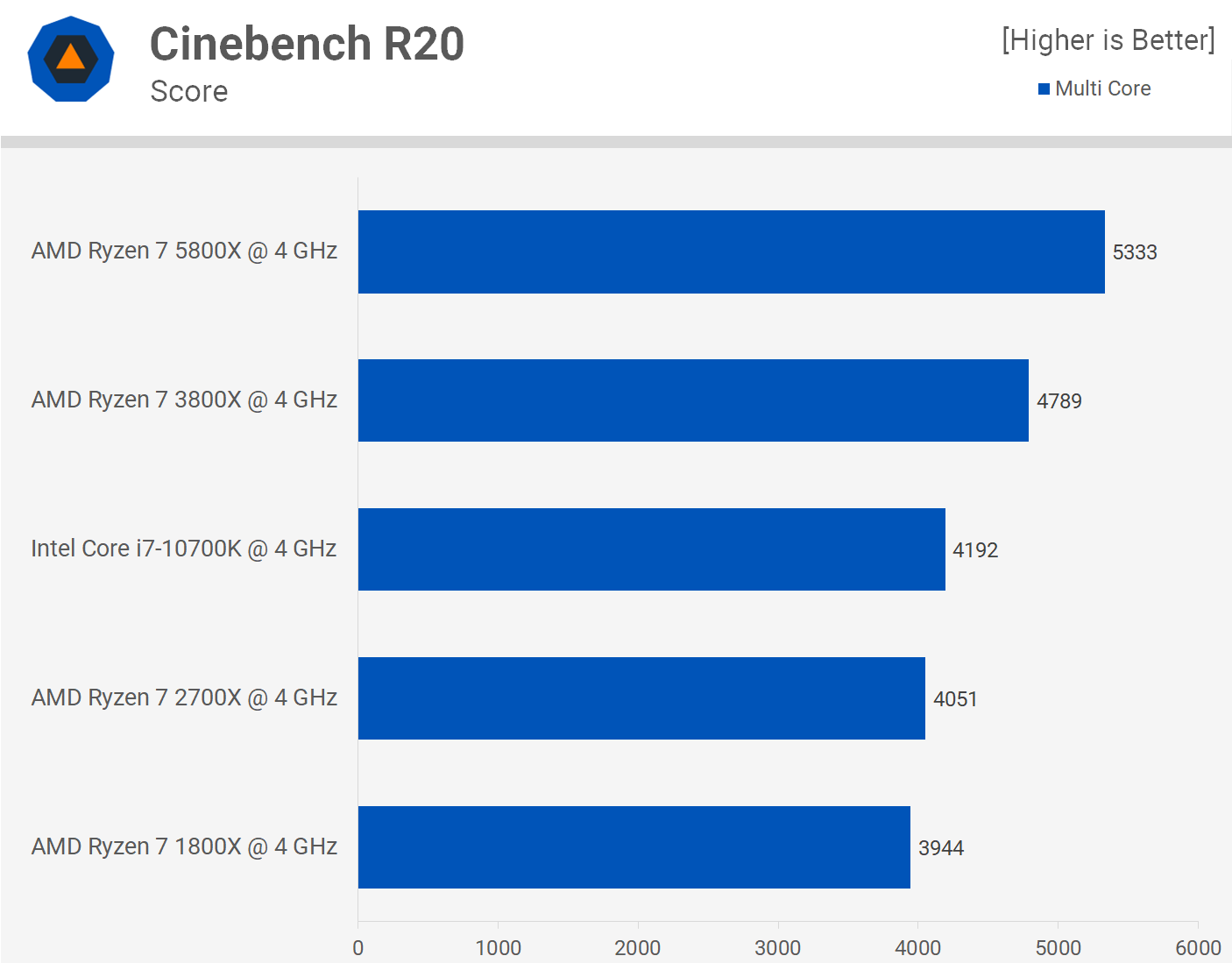
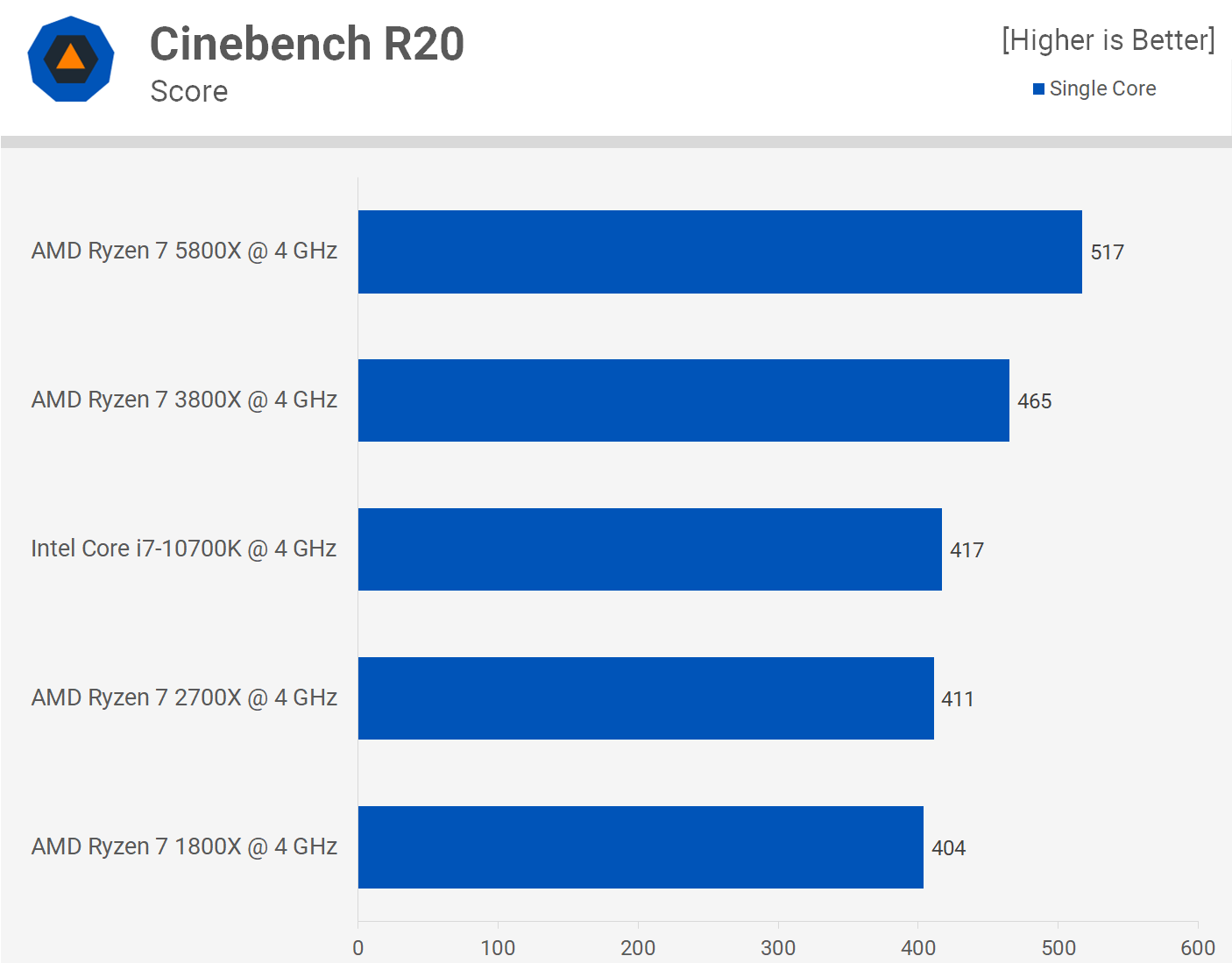
The single core performance is much the same, Zen 3 is 11% faster than Zen 2 and 24% faster than Intel's 10th-gen.

Moving to 7-zip compression performance we find an 18% performance uplift for the 5800X over the 3800X and that meant it was 24% faster than the 10700K. We're also looking at a completely insane 58% IPC improvement from Zen to Zen 3.

The improvements for the decompression test are less impressive, though we're still talking about double-digit gains as Zen 3 was 11% faster than Zen 2. It also left the 10700K well behind, beating it by a 35% margin, AMD's SMT technology is far more powerful than Intel, and that's what we're seeing here.
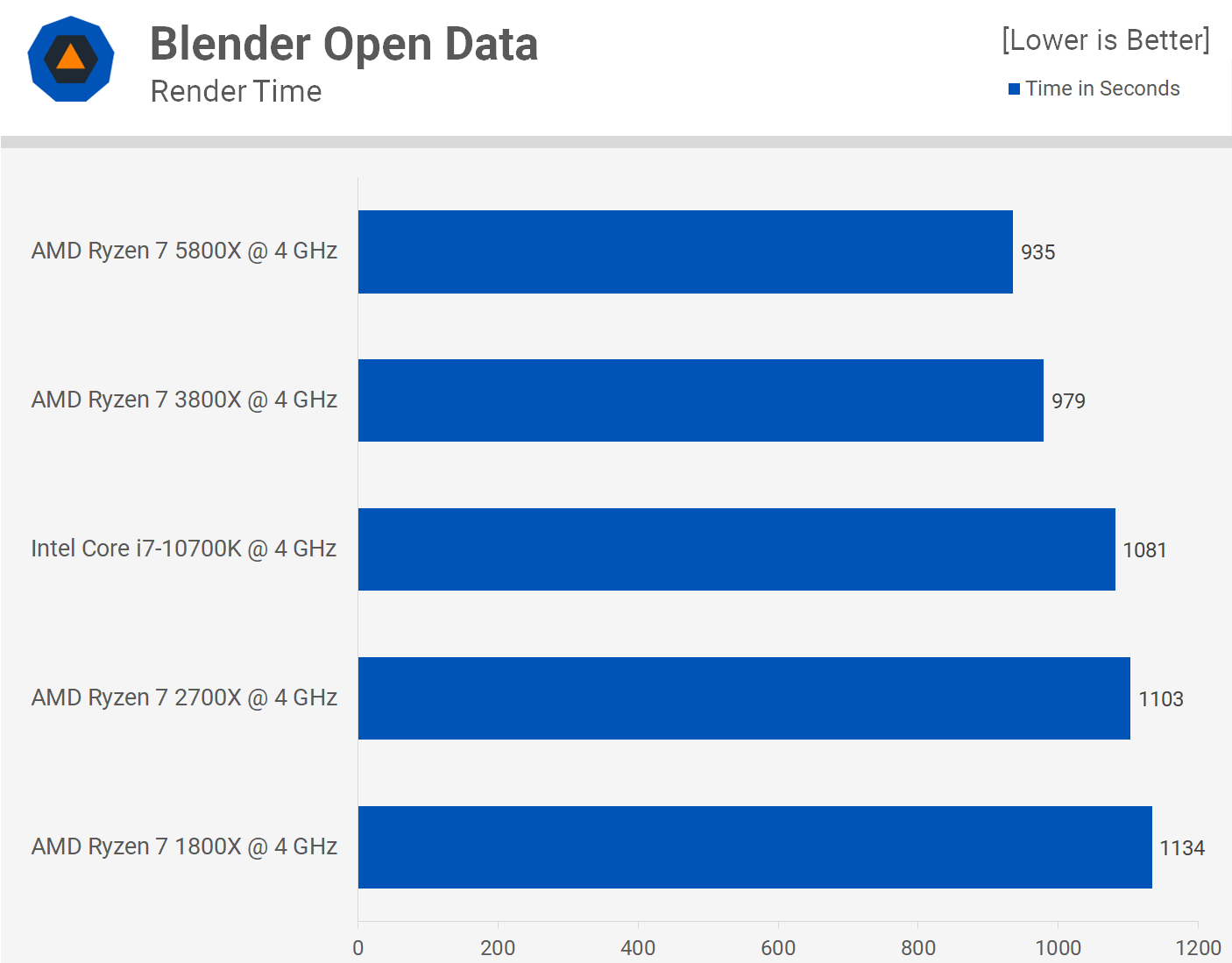
As we found in our reviews, the performance gains in Blender are small and here we can see why. Just a 5% IPC improvement in this test when comparing the 5800X to the 3800X. Even so Zen 3 is 16% faster than Intel's Comet Lake architecture when matched clock-for-clock.
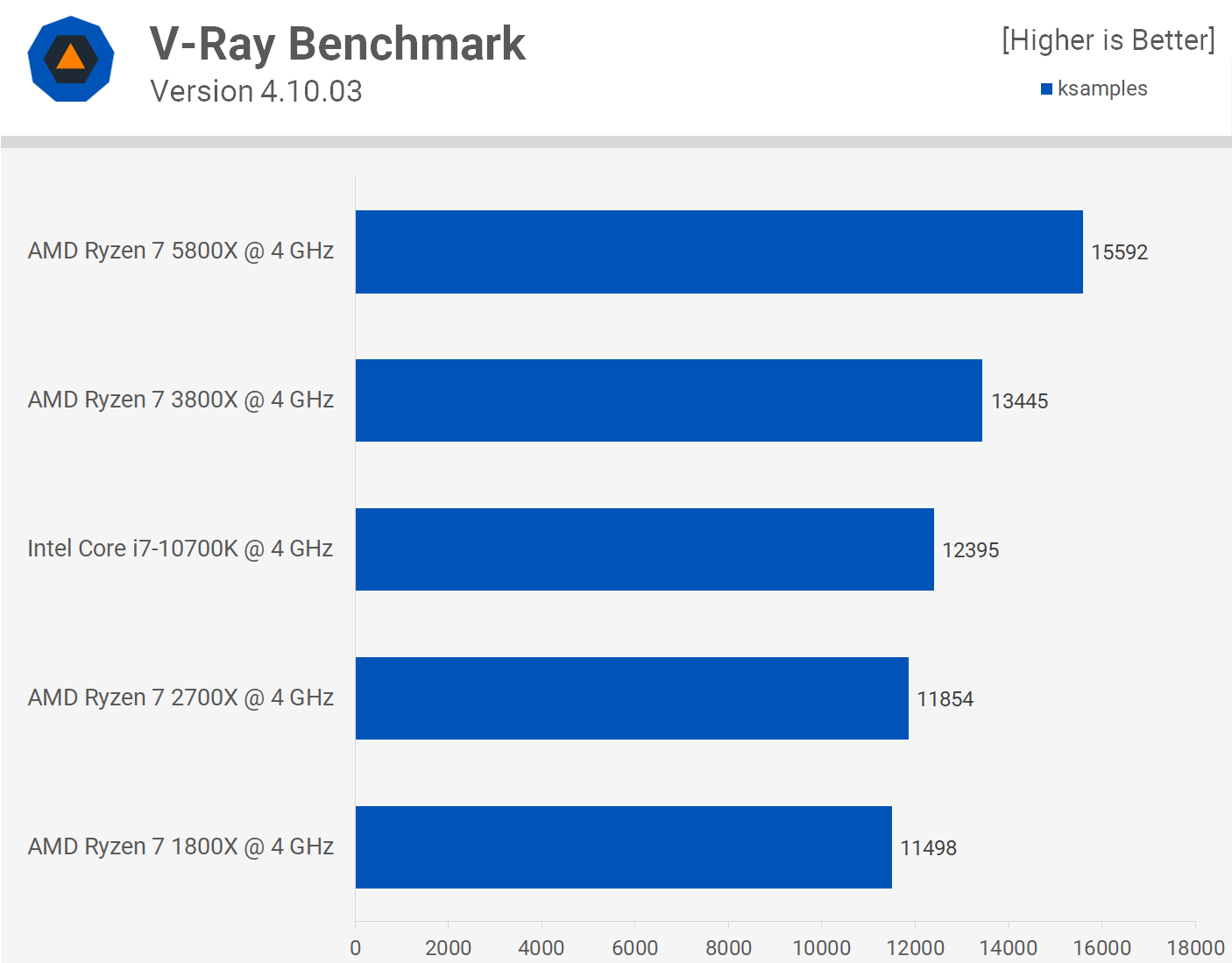
Despite the weak gains in Blender, we found substantial performance improvements in the V-Ray benchmark. Here the 5800X is 16% faster than the 3800X and 26% faster than the 10700K. We're also seeing a 35% improvement over the original Zen architecture.

The performance improvements seen in the Corona benchmark are very strong. The 5800X is 15% faster than the 3800X and 17% faster than the 10700K. Then when compared to the 1800X, the original Zen architecture, we're looking at a 34% IPC improvement.
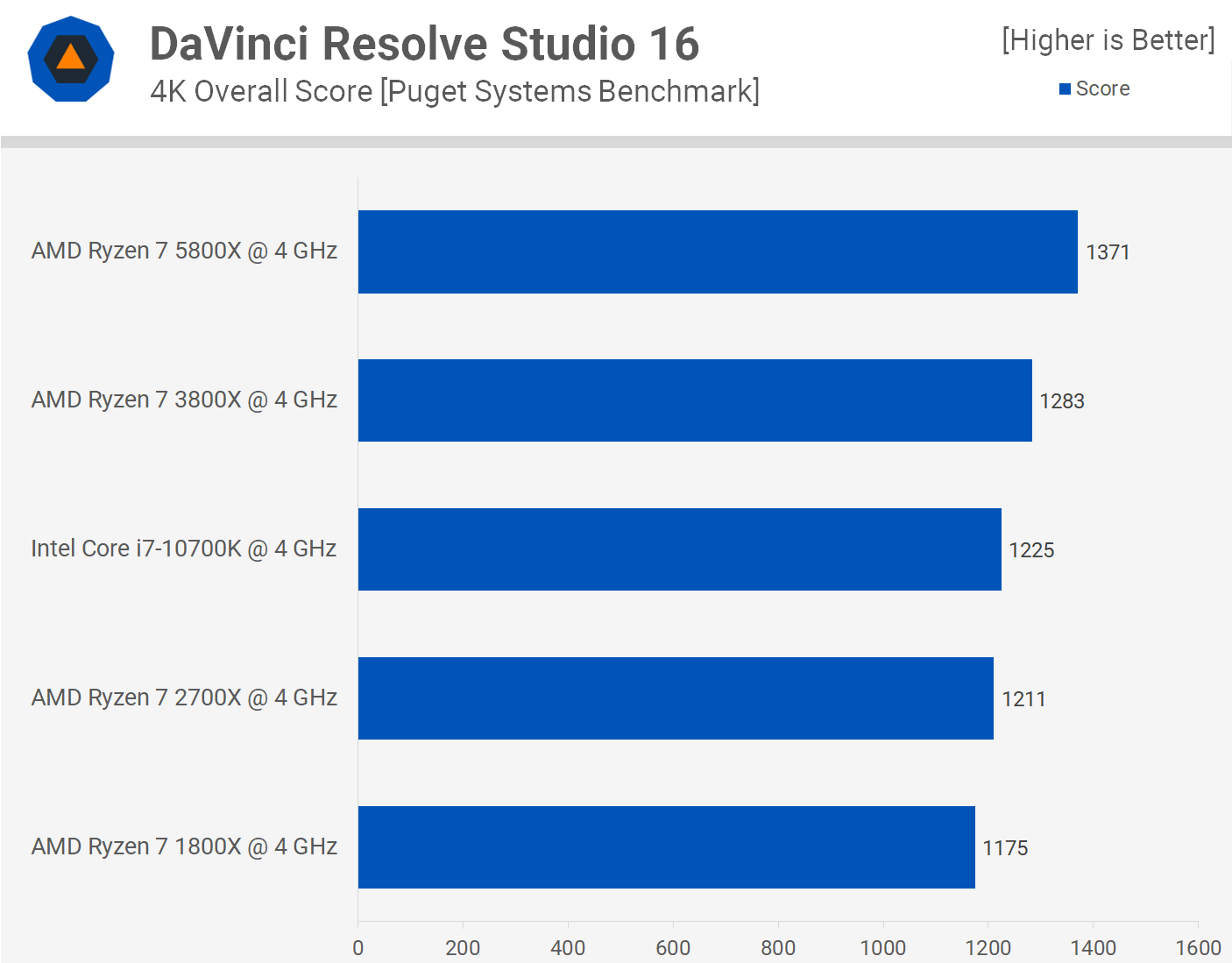
The gains in DaVinci Resolve Studio 16 are much lower than most other applications. We're talking about a ~7% IPC improvement when compared to the previous gen.
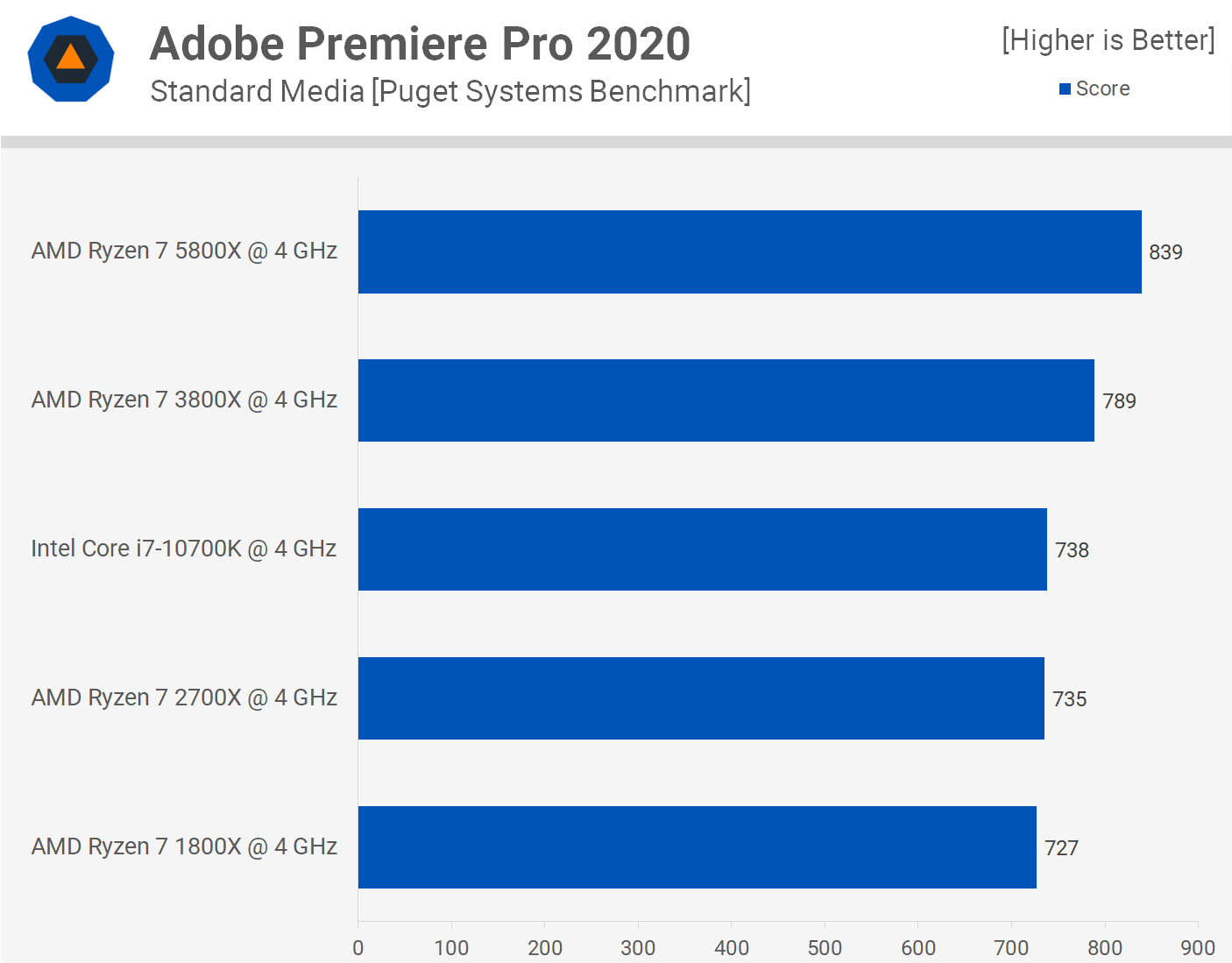
Premiere Pro is another video editing application that doesn't show particularly strong IPC gains for Zen 3, this time a 6% improvement over Zen 2 is seen. The 5800x is 14% faster than the 10700K which is a reasonable uplift at the same clock speed.

Zen 3's massively improved single core performance for latency-sensitive workloads can be seen when testing with Adobe Photoshop. Here the 5800X was 21% faster than the 3800X and shockingly still 18% faster than the 10700K. We really are looking at a new breed of CPU here.

We find a similar situation when testing with Adobe After Effects, though the Zen 3 over Zen 2 gains aren't quite as large, offering a 16% performance uplift. Versus Intel, AMD does make out better, beating the 10700K by a 23% margin.
Power Consumption

Before we move on to gaming benchmarks, here's a quick look at total system power usage. Although we only saw a 5% IPC improvement in Blender for Zen 3 over Zen 2, it's important to note that this performance improvement came with a slight power saving as system usage dropped by 3%. Given both architectures use the same TSMC 7nm process, that's an impressive result.
Even more impressive is that that the 5800X was 16% faster than the 10700K while using 15% less power. Intel has seen better days in terms of performance per watt.
Gaming Benchmarks
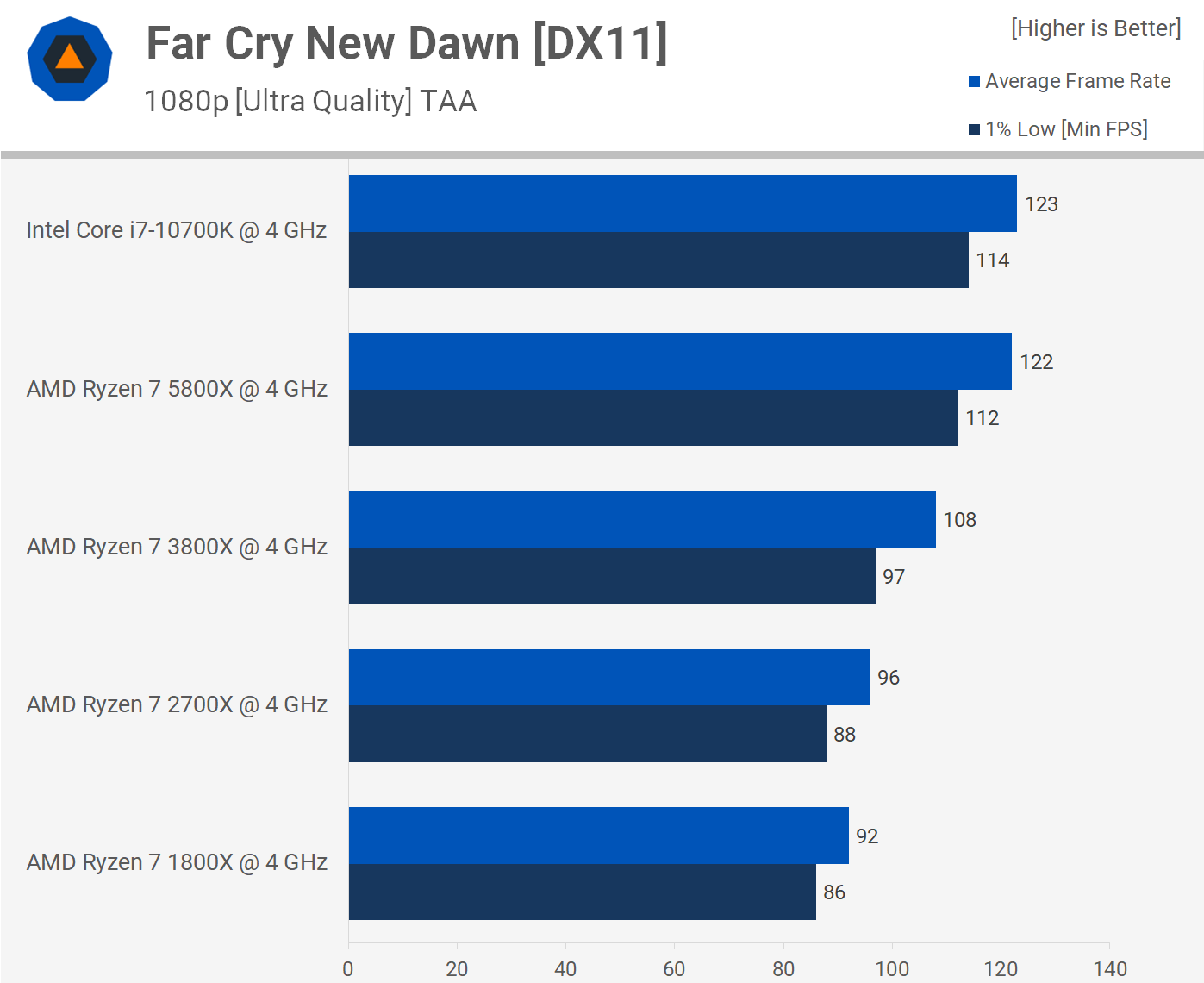
Time for the all-important game performance tests, starting with Far Cry New Dawn. We're looking at a 13% IPC uplift for the 5800X over the 3800X and a 33% increase over first-gen Ryzen. When compared to Intel, AMD now appears to be at parity, at least in Far Cry, a title that AMD has struggled with in the past.

The IPC improvements in Rainbow Six Siege are far more impressive. Here the 5800X was 24% faster than the 3800X when matched at the same clock speed. We're also seeing a 9% improvement over Intel and an incredible 54% improvement over Zen, the first generation architecture.

Watch Dogs: Legion shows an 18% IPC improvement for Zen 3 over Zen 2 and an almost 40% increase over Zen, while AMD's latest also beat Intel's Comet Lake by an 8% margin. Some great gains for Zen 3 in Watch Dogs.

Moving on to F1 2020, we see the 5800X is 6% faster than the 10700K, so clock-for-clock AMD is finally beating Intel in games. That's a 21% gen on gen IPC improvement for AMD and a 45% improvement since first introducing Ryzen.
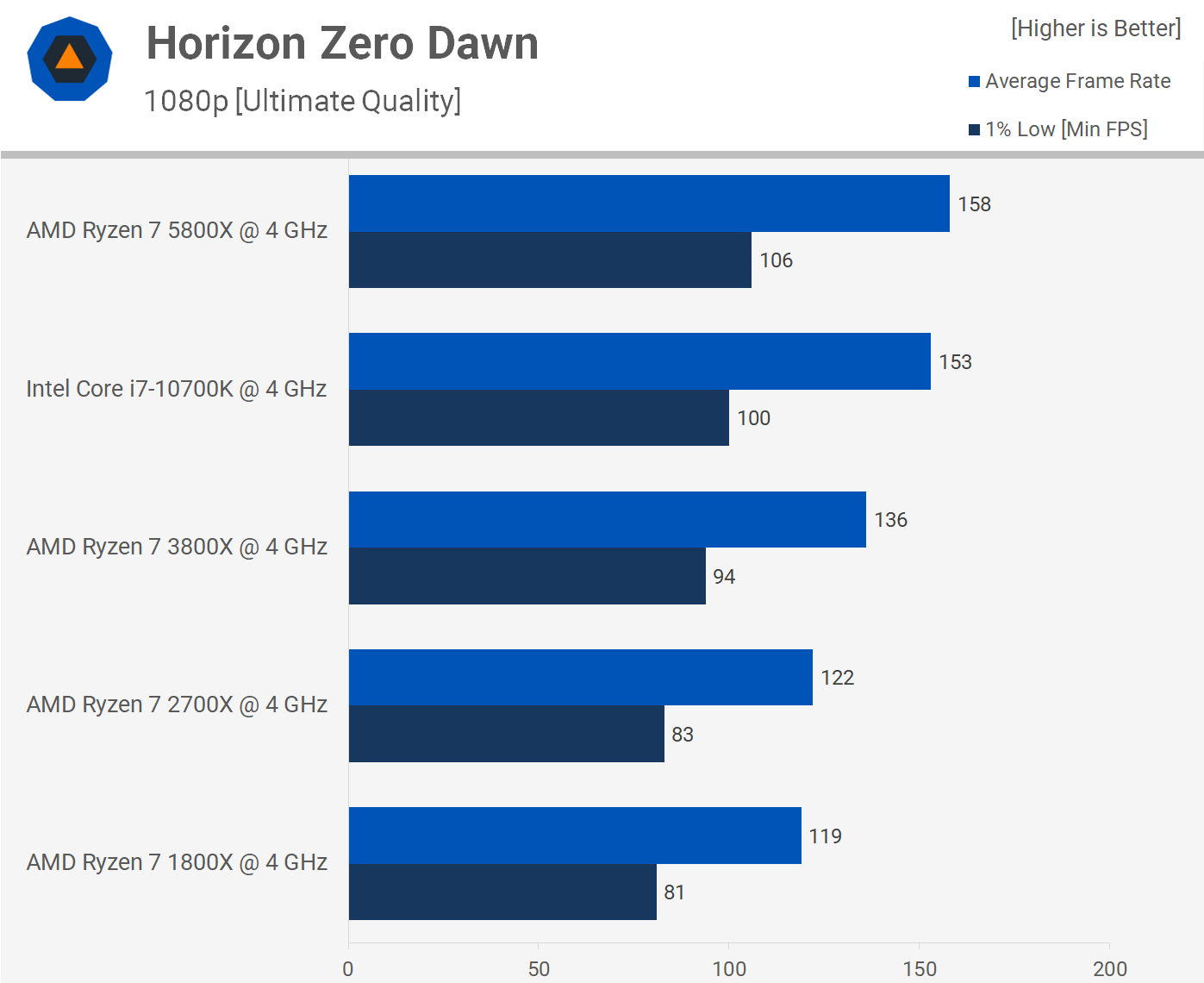
AMD narrowly beat Intel in Horizon Zero Dawn, offering 3% greater IPC performance and a 16% improvement over Zen 2. We're also looking at a 33% improvement over the original Zen architecture.

As seen in our Ryzen 5000 product reviews, the Zen 3 architecture shines in Death Stranding and here we're seeing a 29% increase in IPC with the 5800X over the 3800X. Just as impressive was the 10% margin the 5800X enjoyed over the 10700K.

We're also looking at solid gains in Shadow of the Tomb Raider. This time the 5800X was 24% faster than the 3800X and 9% faster than the 10700K. We're also looking at an almost 50% improvement over first-gen Ryzen.
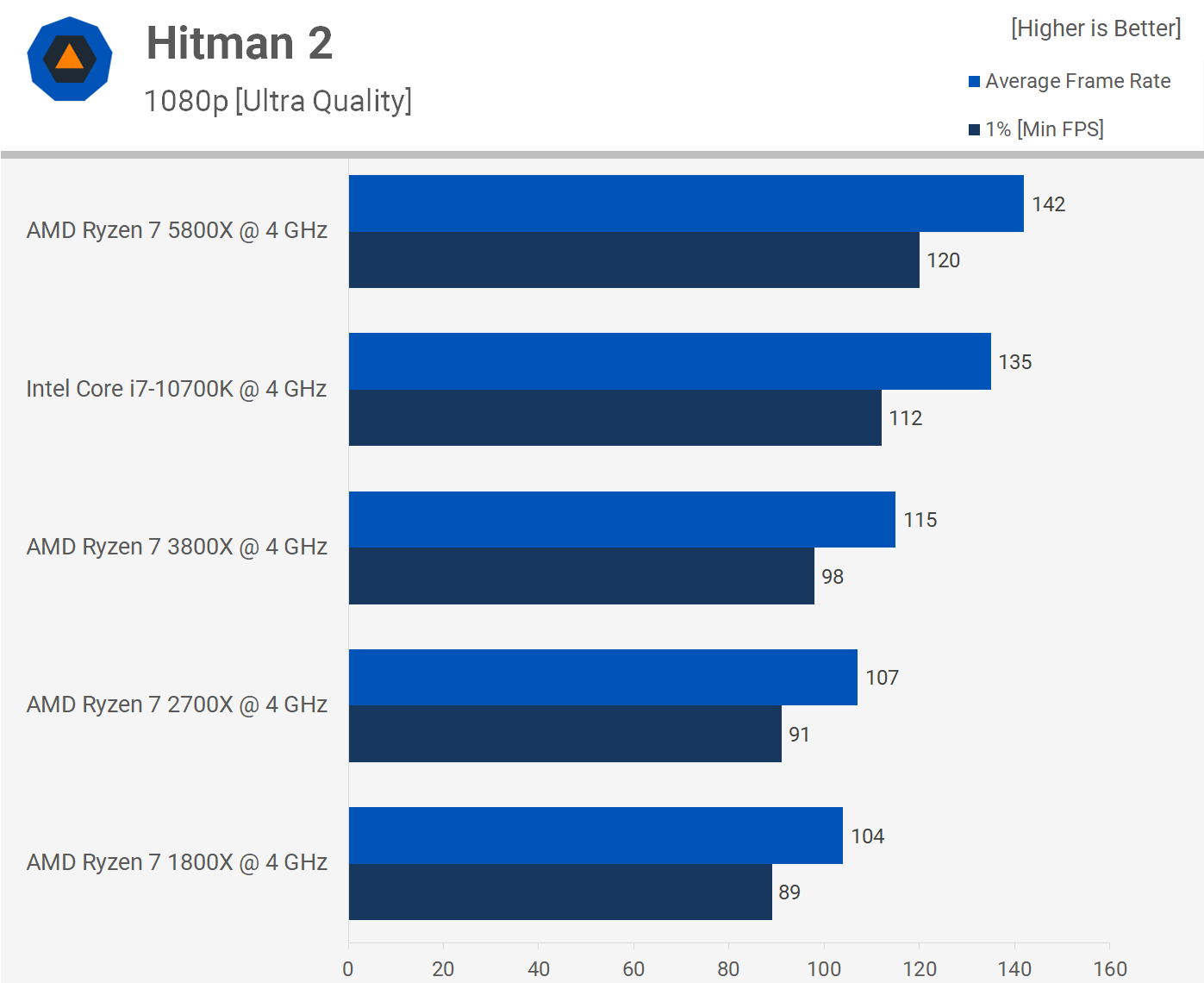
Finally we have Hitman 2, where the 5800X was 23% faster than the 3800X, another massive uplift that's explained by architectural improvements. It also managed to edge out the 10700K by a slim 5% margin, which means that when matched at the same clock speed AMD didn't lose a single gaming benchmark.
Average Gaming Performance
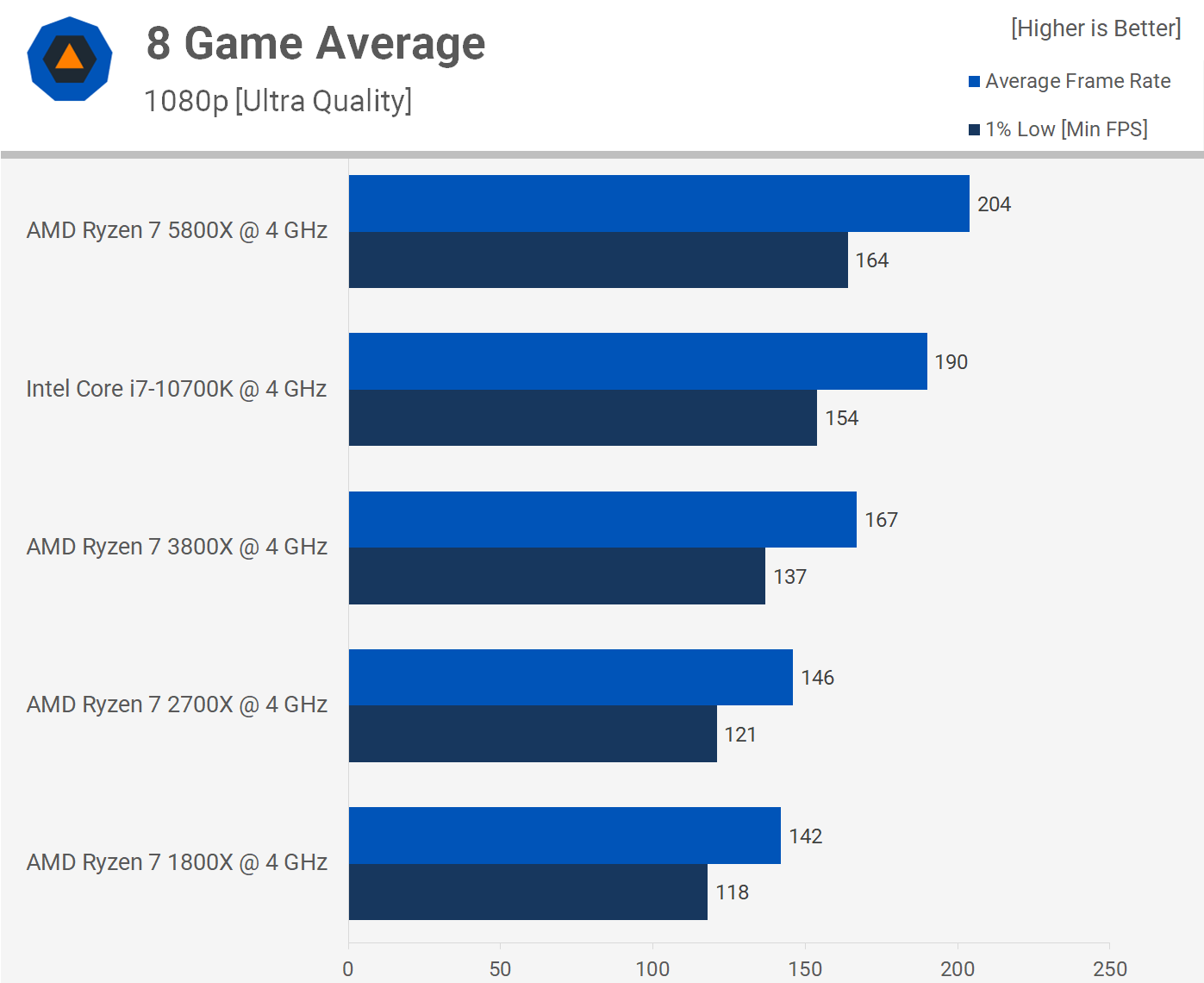
If we average the 8 gaming tests we find that on average the Ryzen 7 5800X enjoyed a 22% IPC uplift over the 3800X and a 7% increase over the 10700K. We're also seeing a 44% improvement from Zen and 40% from Zen+.
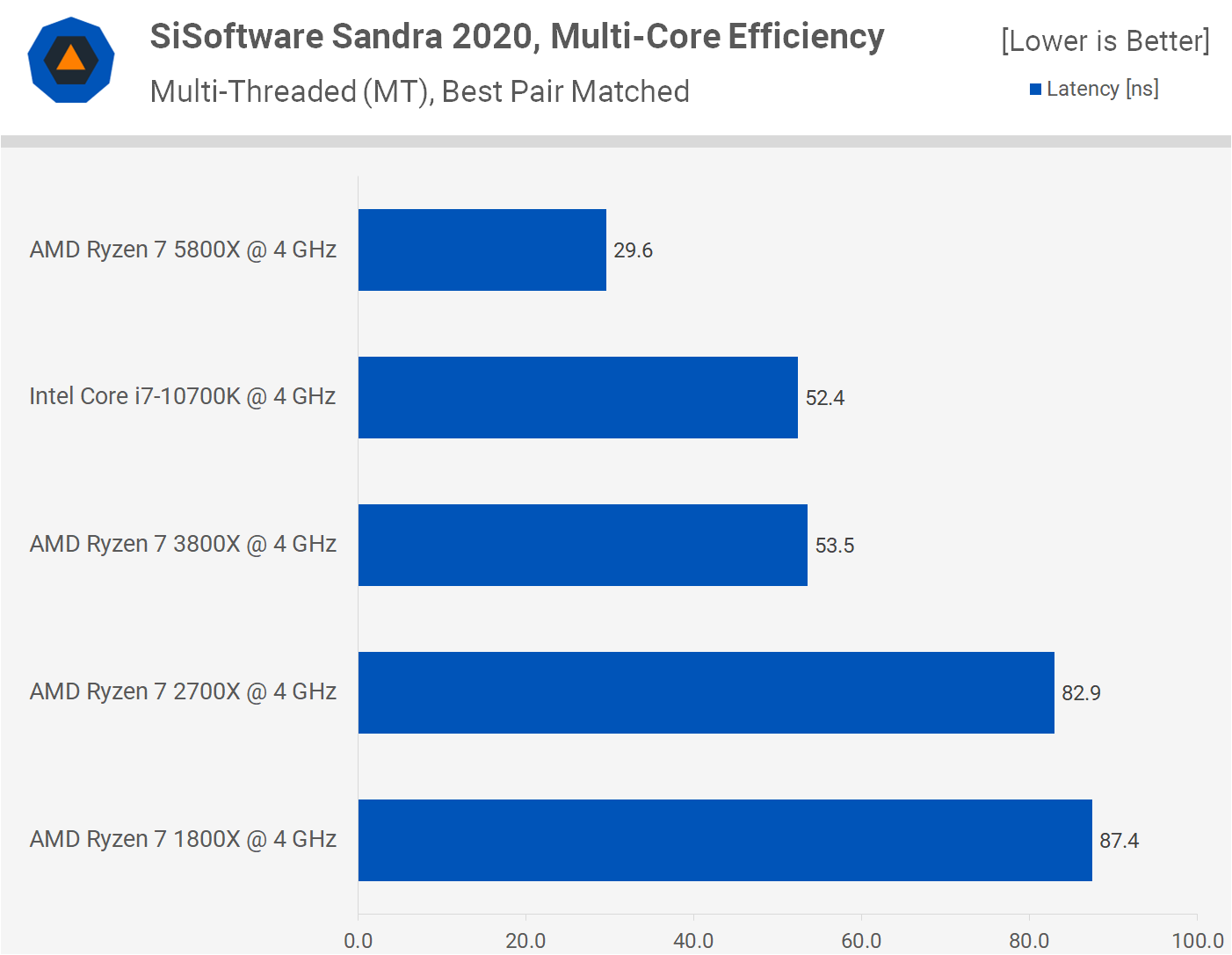
Here's a look at cache and memory latency performance using a full random access pattern. The 5800X sees a 37% reduction in cache and memory latency when compared to the 3800X, which means it's 60% faster. We're also looking at an 8% improvement when compared to the Comet Lake architecture represented by the Core i7-10700K.
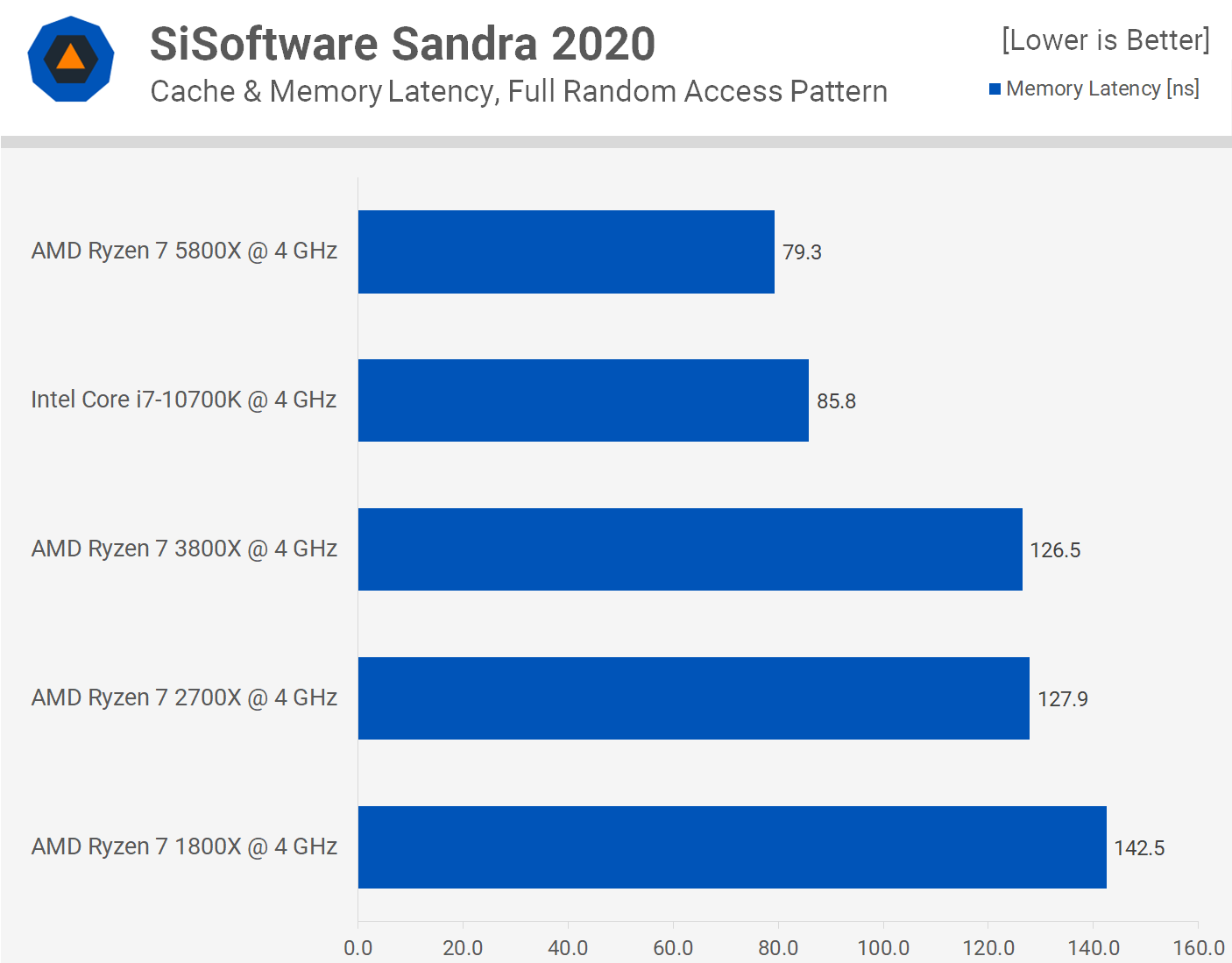
Another big improvement has been made to core to core communication. Here the small 7nm Zen 3 core complex die featuring a single 8-core CCX blows the much larger 10700K die out of the water, reducing core latency by as much as 44%.
We also see about a 45% improvement coming from the 3800X, which features two CCX's each with 4 cores in a single CCD. When compared to first-gen Ryzen, core to core communication latency has been reduced by 66%.
What We Learned
AMD has clearly taken another big step forward with Zen 3. On average, games are showing an average 22% IPC improvement and in applications a more modest 12% jump. Depending on the application, we saw performance gains as high as 21%, in Adobe Photoshop, but as little as 5% as seen in Blender.
Adding together all our application and gaming data tests, we found that on average Zen 3 provided a 16% IPC improvement, which is not miles off AMD's 19% claim – where they admittedly used more applications and games – but the uplift is definitely there.

When compared to the Core i7-10700K, we saw that in the gaming benchmarks Zen 3 was ~7% faster and in applications we're looking at a 21% IPC improvement on average, which does not take into account the notable efficiency improvements. Intel really has their work cut out for them at this point, especially because AMD is aggressively pushing for further gains with Zen 4. Then again, we'd love to see Intel pushing back with better products soon.
Shopping Shortcuts:
- AMD Ryzen 9 5900X on Amazon
- AMD Ryzen 5 5600X on Amazon
- AMD Ryzen 7 5800X on Amazon
- AMD Ryzen 9 5950X on Amazon
- Intel Core i9-10900K on Amazon
- Nvidia GeForce RTX 3080 on Amazon
文章
34
浏览
479
获赞
65853
热门推荐
The summoning circle meme calls upon your deepest, darkest desires
If you could request anyone and anything, what would it be?The new "summoning circle" meme has TwittSamsung launches 17.3
Ever wish you could pick up your TV and carry it around with you? Samsung and AT&T are gearing uMost would pay more than $10 for Spotify, Hulu bundle
If you're a Spotify Premium subscriber and haven't already taken advantage of the free Hulu deal, whColin Kaepernick, Snoop Dogg, and more react to Eminem's heated anti
Eminem left the internet shook during a heated cypher at the BET Awards Tuesday night. Performing inThe new specialty Reese's cups are perfect for the nuanced Reese's palate
The only good news is candy news, so it's wonderful that two new Reese's cups will hit shelves soon.iOS 13 will bring a huge dark mode update to iPhone
If you're a fan of dark mode on just about every device you own, you're really going to like the nexSam Smith just donated a huge chunk of money to the Australian marriage equality campaign
Now that'sputting money where your mouth is.UK singer Sam Smith has made a considerable donation toFacebook accidentally scraped the email contacts of 1.5 million users
Facebook has been embroiled in another password-related mess.As reported by Business Insider, the soA small child tried to fight Gritty
Gritty has been attacked by yet another small child.The Philadelphia Flyers mascot got into a scufflApple's AirPower fail is an unprecedented embarrassment
Apple just owned up to one of its most embarrassing fails of all time.Just days after its star-studdAmazon and Microsoft will go head
For more than a year, some of the biggest tech companies in the U.S. have been competing for a $10 bHow to upgrade AirPods for better fit, sound, and performance
Apple's AirPods (first or second-generation) tend to be the best wireless earbuds for most people. TDark Sky mercifully gives Android users 1 more month until shutdown
Dark Sky has been sold to Apple, there's no changing that.However, Android users of the service willMark Zuckerberg might not be untouchable after all
Mark Zuckerberg may soon find himself in an unfamiliar situation: facing actual, personal consequencTrump didn't receive the warmest Capitol Hill welcome thanks to this protester
When Donald Trump arrived on Capitol Hill this afternoon to meet with GOP senators to discuss tax re
 科技创新!
科技创新!